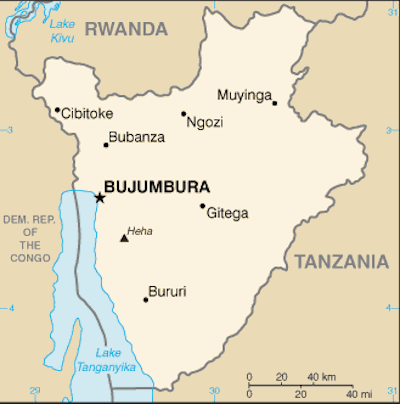The attempted military coup in Burundi this week, which sought to halt the president’s unconstitutional bid for a third term and to end the violent police crackdowns on protesters, has failed decisively, after a day of heavy fighting in the capital. The putsch lasted about two days before fizzling.
Several coup leaders have been arrested and the ringleader (who may or may not have been among those arrested already) publicly admitted failure:
Gen Niyombare, who launched the coup attempt on Wednesday, told the AFP agency: “I hope they won’t kill us.”
[…]
“We have decided to surrender,” Gen Niyombare told AFP. He added that troops loyal to the president were approaching him.
A co-conspirator had admitted defeat earlier and acknowledged that the army is overwhelmingly standing by the president:
General Cyrille Ndayirukiye told the AFP news agency that most in the military wanted to keep the current government in power.
[…]
“Personally, I recognise that our movement has failed,” he said, according to AFP. “We were faced with an overpowering military determination to support the system in power,” he added.
The loyalist faction’s leadership was jubilant and explained how they had persuaded a majority of the army not to join the coup:
Army chief of staff Gen Prime Niyongabo [who remained loyal to the president] told the BBC’s Maud Jullien the number of soldiers backing the coup had fallen.
“On Wednesday evening we gave them the chance to rejoin the army to avoid a bloodbath. But they [likely a smaller faction] tried to attack the radio station today (Thursday) – the army repelled the attack.
“We are in control of all strategic points in the country. Burundi is a democratic nation. The army does not interfere in politics. We are obliged to follow the constitution.”
To their credit, the loyalists are using the words “democratic” and “constitution” a lot, while emphasizing non-interference, in explaining their opposition to the coup. But of course it’s worth remembering that the president isn’t following the constitution either.
Still, I suppose political neutrality is a better impulse than coup. But it might not be an enlightened decision so much as a result of careful planning since the end of the civil war that resulted in the restructuring of Burundi’s armed forces to make the army’s kaleidoscope of factions so internally jumbled that allegiances either lie with no one or with the political system, but not with specific leaders (whether military or civilian). If one person attempts to stage a mutiny or rebellion, it is difficult to rally significant forces quickly to the mutineers’ cause:
“The commanders and their deputies are rarely of the same ethnic group — and even less of the same political persuasion,” the ICG said in a recent report about the army and police, noting that old allegiances dating back to the civil war are still very much alive, creating divisions with the institutions.
At the same time, those divisions could ironically help the army stay together.
“The two former enemies are working in harmony but the differences are still there — but they are not confident enough to come together for a coup,” said a former senior army officer, saying Tutsi soldiers would never act alone for fear of reprisals against Tutsi civilians.
In other words, if a Hutu general orders a coup, the Tutsis will not follow. And the Tutsis will not rise up because they are outnumbered and their own commanders are not consolidated within the same units. Even officers from varying ethnic and civil war era political factions have been redistributed so that it makes them unlikely to have the automatic support of their immediate superior or junior officer unless the order is widely seen as neutrally acceptable and appropriate within the political structure. Neutrality and/or apathy are the watchwords of the day in Burundi’s strategically merged army — unlike in South Sudan, where the “integrated” post-civil war Army simply split back into its constituent (ethnic) factions to resume fighting each other the moment there was fear that one ethnicity might be targeting another.
Still, it is also possible that the “neutrality” has rubbed off from extensive U.S. training in peacekeeping operations. The Wall Street Journal:
After Nigeria — a country 18 times more populous — the U.S. trained more soldiers in Burundi than any other sub-Saharan African country between 2007 and 2014, according to publicly available data from the U.S. State Department. In the first nine months of 2014, 6,298 soldiers from the tiny country went through courses including advanced special operations, language classes and counterterrorism studies.
However, if this pro-democracy and pro-constitution attitude in Burundi’s armed forces is the result of U.S. training (rather than apathy and the survivalist neutrality of disarray) that would be a very unusual (and positive) development…in light of the U.S. training role in the armed forces and specific officers that seized power in Burkina Faso and in Mali just in the past four or so years. (Edit: An additional coup attempt in Gambia failed in December, resulting in the deaths of a U.S. Army reservist of Gambian origin and a U.S. asylee / Gambian ex-colonel who had been trained in the U.S. by the U.S. Department of Defense.) I also don’t know whether the officers supporting the failed Burundi coup were themselves U.S. trained even if unsuccessful.







